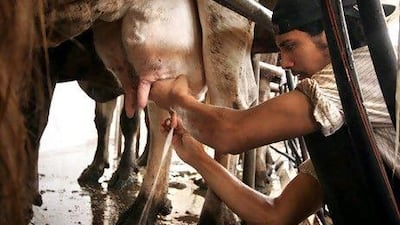Juhayna, Egypt's largest player in the dairy market, is hoping to convince Egyptians milk is good for the nation as well as the company's share price.
Financial Fallout: Read The National's coverage of the global economic chaos
Dark clouds force Opec to cut back oil forecast Opec lowered its forecast for global oil demand, giving ammunition to member countries who have pushed for production drops. read article
Crash halts as traders try to stem losses The stock market crash in Europe halted abruptly yesterday as traders tried to claw back billions of Euros of losses accumulated in more than two weeks of turmoil. Read article
Money exchange braced for recession drop-off Business at the UAE's biggest money-exchange network could decline by as much as 15 per cent in the event of a second global downturn. Read article
Gulf's US assets in firing line Standard & Poor's downgrade of the US rating has raised questions about the wisdom of keeping a large portion of the Gulf's several trillion dollars of savings in US treasuries. read article
The company reported yesterday a 12 per cent rise in the first-half net profit to 112.2 million Egyptian pounds, from 100.4m pounds in the same period last year.
Egypt, the region's most populous country, has among the lowest milk consumption rates per capita in the world.
Juhayna could produce double-digit earnings growth due to the country's favourable demographics, as well as increased awareness of the health benefits of drinking milk, said Hatem Alaa, an analyst at AlembicHC in Cairo. Mr Alaa has an "overweight" rating on the stock.
Juhayna is positioning itself to capture growth in the sector by investing in logistics. It owns and operates 532 vans and 22 distribution centres across the country, allowing it to reach about 70 per cent of the retail market, and plans to add about 240 vans and six more distribution centres this year.
It was also considered a positive sign that Juhayna raised milk prices by 10 per cent last month with little impact on sales.
The company raised 999m Egyptian pounds in an initial public offering (IPO) in July last year. Those proceeds are mostly being invested in dairy farms with the goal of producing 50 per cent of the company's raw materials, up from 10 per cent currently.
Shares of Juhayna have already risen by 17.5 per cent since the IPO while the EGX30 Index has gone down by almost 30 per cent during the same period.
Mr Alaa forecasts the company to show 28 per cent earnings growth up until 2015. He said he preferred Juhayna over its regional competitor, Saudi Arabia's Almarai.
"We see greater potential for upside surprises for Juhayna in the medium to long term, given the huge potential for Egypt's dairy market versus Saudi Arabia's, where annual growth is capped at between 10 and 12 per cent," Mr Alaa said.

